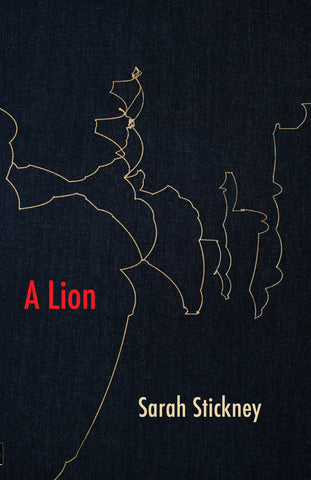A Lion by Sarah Stickney
Pleasure—pleasure for pleasure’s sake, and pleasure in the face of trouble and sorrow, the limitless yes—that is what poetry was made for. Remember Sappho, kids? Remember Adelia Prado and Frank O’Hara? For certain folk, pleasure is the shape that courage takes in the body—they have heart, “that animal in an animal.” The best of these folkies—and Sarah Stickney is surely one—have all the wit and slyness needed to keep that heart alive and pumping, no matter what. Always welcoming, sometimes ruefully ironic, these poems have plenty of trouble in mind, the basic human thing you might say, being too honest to avoid it, but they insist over and over on delight—in touch, in talk and laughter, in food and drink, in solitude, in vulnerability, even in misery. There is delight even in misery, did you know that? Read this book, and it will show you where. It’ll give you the how and why. The book is so damn good.
—David Rivard
Poetry likes to be serious about casual matters like flowers and coffee, revealing them to mean more than they first appear, squeezing out the unconscious via the indirection of description. But Sarah Stickney’s poetry performs poetry’s other gambit—to be (apparently) casual about serious matters, reminding us of all the things we can’t seem to be able to say even if they’re as obvious as flowers and coffee.… Stickney’s concise lyrics offer quick takes and sharp judgments as they make available interior conversations whose uncanny logic kicks back against civilization itself. What might be most anachronistic—and most vital—about this book is that Stickney writes as a woman interested in women, not only erotically (and not primarily so) but intellectually, theoretically, personally, and therefore, of course, politically, since, after all, what is politics really but the way we live with other people? … Indeed, Stickney doesn’t sound like many American poets of her generation, of any gender—these poems layer satire upon their sincerity. They substitute punch line for epiphany; they wrap knowledge in a joke; they sigh with anticlimax at the exact moment knowledge descends.
—Katie Peterson
I love to read the poetry of Sarah Stickney, I’m rejoicing in this first full-length collection. It’s like reading the classics without the idiocy of myth, which is also true of some of the classics. A Lion is a book we have been waiting for if we love the ability of poetry to embrace life and introspection in one swoop of lyric space, personal space the model here, intimacy with one’s own self and heart and mind and body the necessary condition for poetry and readers and relationships. This is a book full of love and travel, and some high-quality drinking, and what life is like if you are full of honesty and love and courage and are unafraid of change, unafraid to find out what you really feel and know. Then again, this is also a great book if you are interested in how places and people look and feel, places maybe you never have been, like Stickney’s Italy that is sort of like Patrizia Cavalli’s Italy, and then again, it’s a photographer’s Italy, and a fiction writer’s Italy. Or you want to see a place you hurried by, unheeding of the blast of place-spirit, like the side of a downtown ritzy hotel in Baltimore. American poetry, we have been bereft of the earthy poetry-spirits of Charles Simic and Linda Gregg, and we never have had enough Ritsos, and we only have Patrizia Cavalli because of people like Sarah who can read Italian poetry, but now, thank God, we have A Lion by Sarah Stickney, and I’m already looking forward to her next book.
—David Blair
A Lion
by Sarah Stickney
$19.95, paperback, 98 pp
ISBN-13: 978-1-952335-75-4






